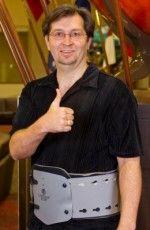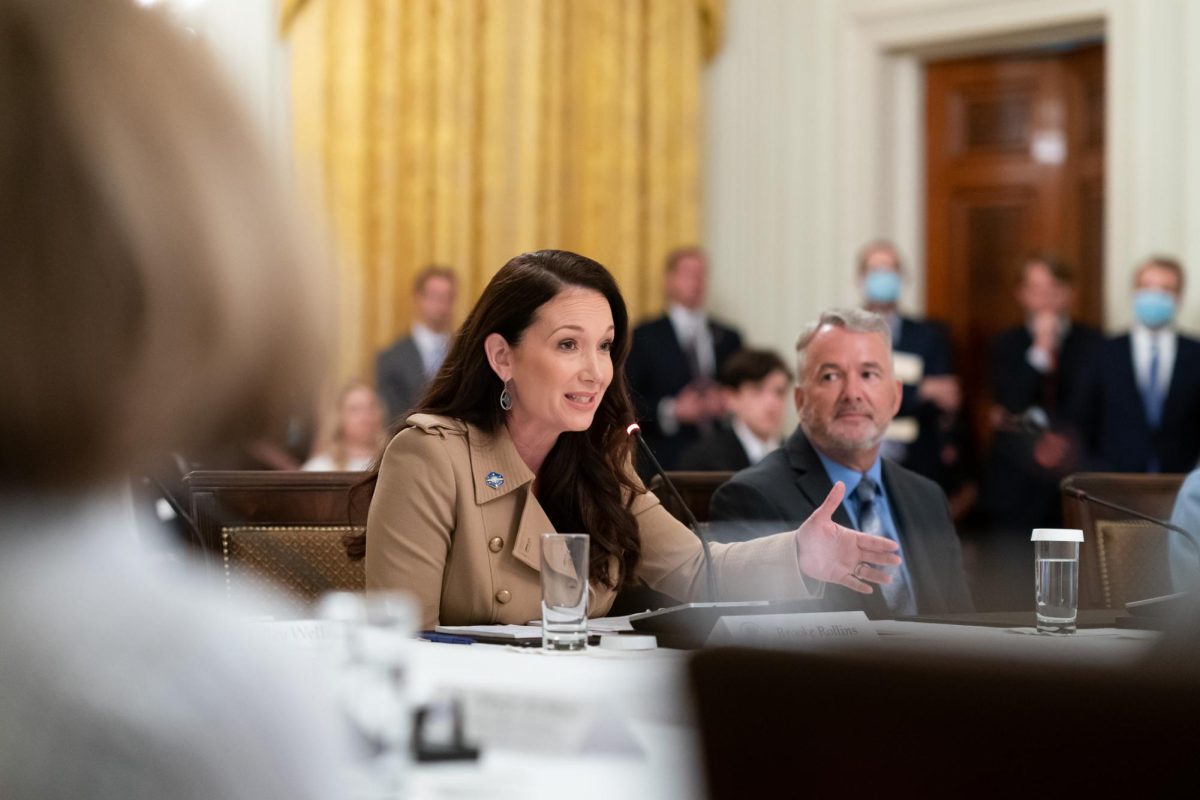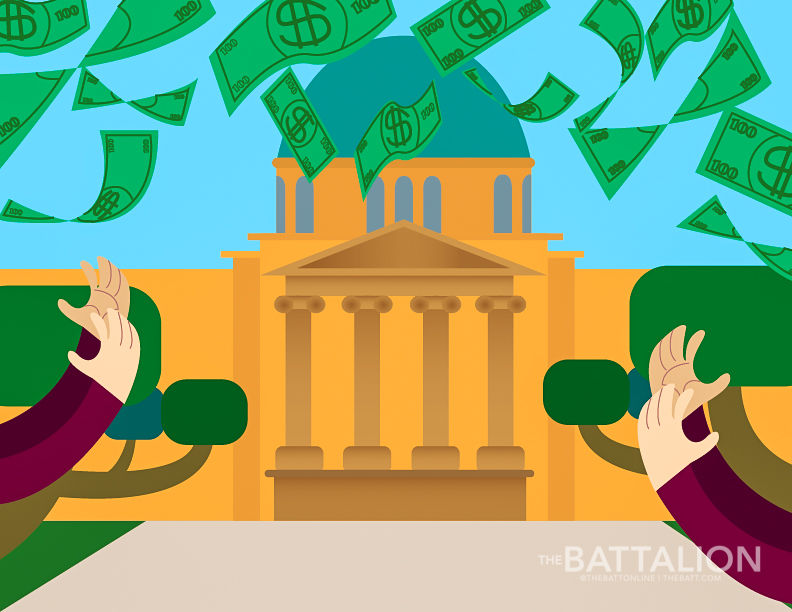At many commencement ceremonies, graduates are often urged to pause and take stock of their college careers. For one student, this consists of a nearly 15-year long odyssey through hospital beds and rehabilitation clinics. It started with a bloody and defenseless man lying beaten on a Huntsville road.
Halting every few moments to collect his thoughts and with frequent glances down to his Aggie Ring, Don Mathews Jr., senior agricultural leadership major, prepares to once again tell his story his terrifying account of a September 1998 night that forever changed his life.
Don was at a friends house celebrating his 21st birthday party. A group from Madisonville, unknown to most partygoers, showed up and were asked to leave after a fight broke out.
As Don left the party, three men from that group brutally assaulted Don and left him for dead. Though he had never met any of them, they proceeded to punch and kick Don as he lay lifeless on the ground. The three men had chosen a random victim in retaliation and brutalized him.
Barely breathing, Don was driven by friends to Huntsville Memorial Hospital. He was then transferred to Memorial Hermann Hospital in Houston, while doctors gave him a 50 percent chance of surviving the trip, Don said, recalling the details told to him in the ensuing months and years.
Of course, he has no memory of that entire year, said his mother, Regina Mathews, who has worked tirelessly to rehabilitate her son. Weve gathered info from different people who were there, or pieced together information from the trials. Dons had quite a struggle dealing with his traumatic brain injuries.
Dons closed-brain injury considered the worst class of brain trauma left him in a three-month coma. For the next year, Don is shuttled from hospital to hospital, recovery seeming further and further away.
My first memory since the accident is of summer 1999 at a rehab facility in Galveston, Don said. I remember being in a wheelchair.
The wheelchair proved to be a source of frustration for Don, a constant reminder of his injuries. The tall, athletic student loved playing sports before the attack, and being bound to his chair was just the first of many struggles Don came to face. He soon discovered hed lost 40 pounds in the hospital, and was forced to relearn almost everything about day-to-day life. He said hed taken for granted the simple things, such as walking, talking and remembering.
Even after he was awake, he couldnt talk for four months, he couldnt focus, and you didnt know if he understood you, said Regina. It was like having a baby, then watching him grow up all over again. All his developments came in stages. Its never like in movies where youre suddenly awake and ready to return to life.
Despite these hardships, and knowing how difficult it would be to live a normal life, Don came to believe in one mission: to receive a degree from Texas A&M University. He shared his goal with numerous doctors he came in contact with, many of whom applauded his ambition but cautioned him from getting too hopeful. With injuries such as Dons, the brains ability to retain information is often so damaged that memorization, a key part of many college classes, is hampered.
While working with her son, Regina warned Don that Texas A&M was a challenging school in its own right, and with his injuries it was OK to seek success elsewhere. But, Don remained adamant.
Ill never give up. Im going to A&M, Don said.
Despite doctors doubts, Don enrolled in adult education classes online, then signed up for classes at Sam Houston State University. In fall 2000, less than two years after his attack, Don was doing the unthinkable he was back on track for a college degree.
By January 2005, Don transferred to Texas A&M as a psychology major to achieve the degree denied to him eight years earlier. Don said he wanted to be a counselor for disabled crime victims he wanted to help people recover from the same issues he was forced to overcome. However, despite his ambitions, vestiges of his injuries came to haunt him. Depression, a common ailment for brain trauma survivors, took hold and sidelined his education. In 2009, he was forced to leave school for 10 months.
When he came back, his learning problems continued. Despite devoting countless hours to his studies Don can only take one class per semester. Even so, Don was unable to pass a memorization-heavy class required for his major. After being unable to resolve the issue and at-risk of failing the class, Don considered leaving Aggieland for what he feared would be the last time.
However, with the help of University staff and the Agricultural Leadership department, Don was able to secure a new major, one that ensured he could continue to study at A&M.
Still another year away from graduation, the Mathews family refused to give up. Regina began to give Don different medications to alleviate his depression, use novel learning techniques and memorization drills to guarantee her son would achieve his dream.
Were probably the reason the cost of index cards shot up in the past years, she joked.
When not studying, Don and Regina work to ensure that the tragedies they suffered dont occur to others. Working with Bill Glass Prison Ministries, Don helps criminals see the face of their victims in an effort to stop them from repeating their actions. One of her hardest experiences was confronting one of the men who assaulted her son during the trial.
I brought pictures of my son lying in the hospital to the bewildered prisoner, Regina said. Then I said, You took something precious from me. In my faith, I forgive you.
The prisoner was astounded that the mother of the man he beat could forgive him for what he did.
I think it made a bigger impact than shouting would have, Regina said. Those might have been the first kind words hed heard in his life.
The prisoner died from disease six months later, still in prison.
Don also managed to set aside his anger and forgive his attackers. In an essay for a class, he wrote, Forgiving those guys has been the hardest thing I ever have done in my life. I pray they come into a real relationship with Jesus Christ and earn their redemption by being allowed into heaven.
Don said he found forgiveness to be one of his strongest sources of healing.
In August, Don will finally graduate with his bachelors degree, overcoming over a decade of struggles. He no longer plans to become a professional counselor, and instead will return to Huntsville to find a part-time job and continue his studies online with a seminary in Dallas.
Although his limp, back brace and stilted speech serve as long-lasting scars of his attack, Dons Aggie Ring and degree are an inspiration to his friends and those who know him. The lessons he and his mother learned on his path to recovery taught them about perseverance and humanity.
Sometimes, seeing a disabled person you might just stare or ignore them. But you have to remember, all it takes is one accident to put you in the same situations, Regina said. There [are] game changers out there, but they dont make you any less of a person. Perhaps people dealing with disabilities can understand life even better.
Don, too, learned far more than he expected from that fateful September night. Once an eager partygoer, Don has learned to take life more seriously.
Now, Im much more aware of people with difficulties and disabilities. Before the injury, I was a completely different person. I partied and lived a typical college life. Now Im much more cognizant of how the party life is not the way to go, Don said. You have to take care of buddies, help others. You have got to love your friends and family.
Road to resilience
July 31, 2012

0
Donate to The Battalion
Your donation will support the student journalists of Texas A&M University - College Station. Your contribution will allow us to purchase equipment and cover our annual website hosting costs.
More to Discover








